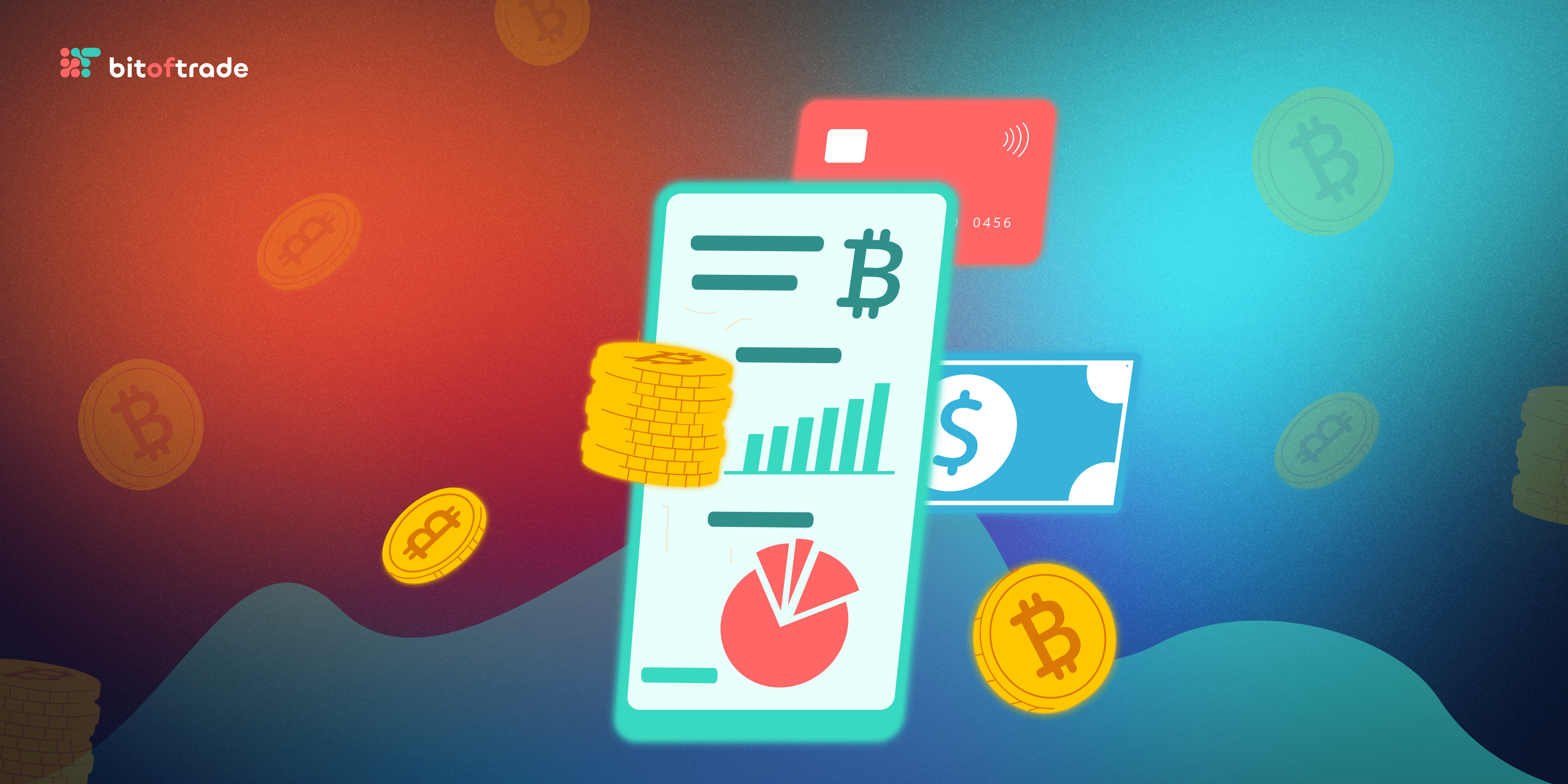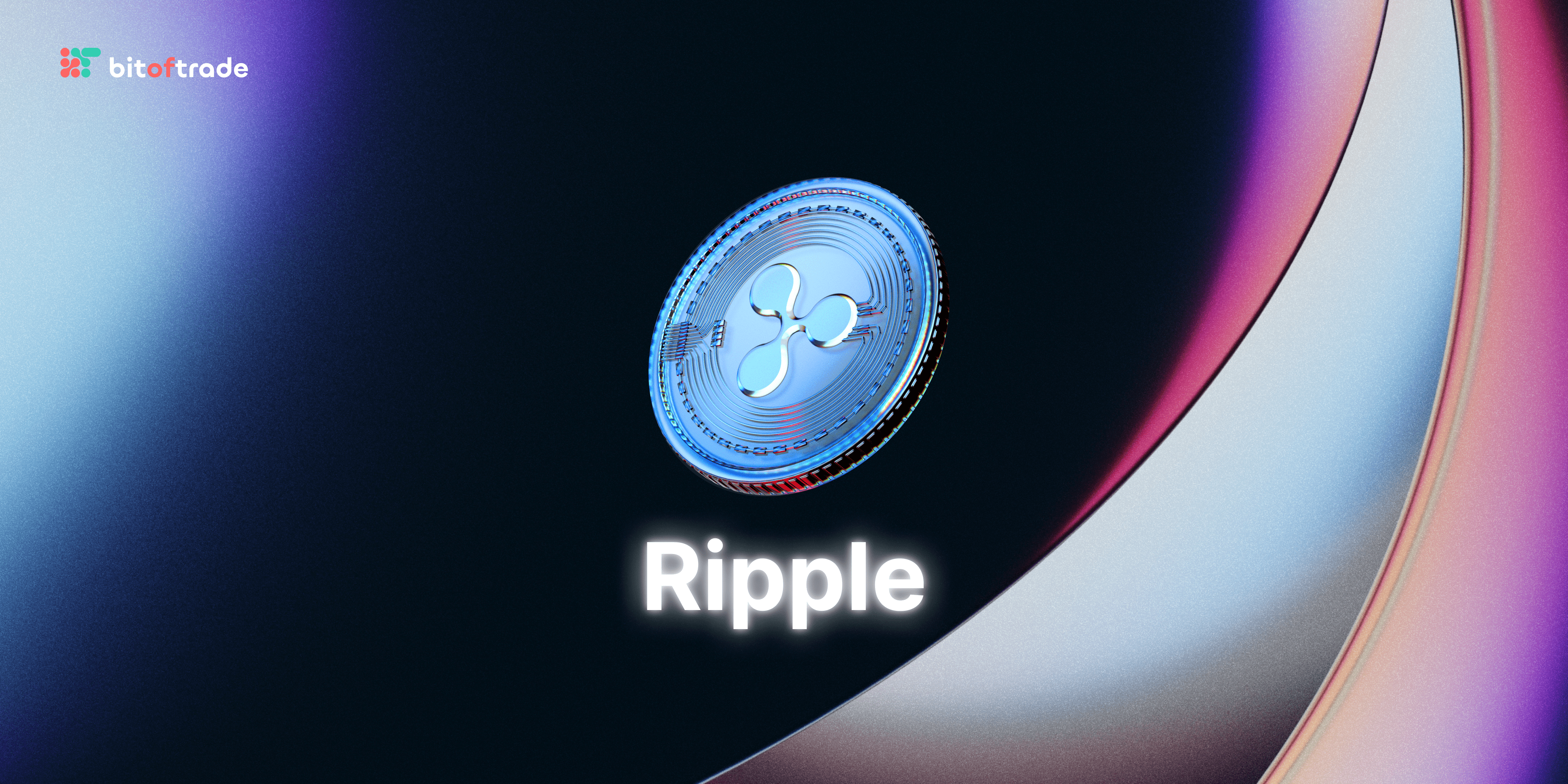It seems that we are used to thinking of cryptocurrencies primarily as an investment.
Crypto analysts, using technical analysis, seek to predict price movements and changes that indicate the beginning and end of a bull and bear market. You can read about what bullish and bearish trends here.
Traders seek to win on the difference in rates by swapping cryptocurrencies and using tools like leverage trading. You can try out swaps and leverage trades up to x20 in the bitoftrade trading widget.
However, this does not end the options of utilizing cryptocurrencies. Do you remember for what reason Bitcoin was used for the first time? To buy pizza. Initially, crypto was assumed to become an alternative to traditional finance, and would save users from middlemen and deliver the control over funds to the users.
Today we will tell you how to utilize cryptocurrency as a means of payment.
Crypto as a Payment Method
Did you know that on the website of the online travel company Travala.com you can pay for your hotel stays with cryptocurrency? Have you heard that you can pay for coffee with Bitcoin at Starbucks?
For several years now, top brands and services have been striving to introduce alternative methods of digital currencies to increase their presence in the market and satisfy the needs of their users and customers.
Unfortunately, not all businesses and corporations understand the benefits of using crypto as a means of payment yet. However, not everyone understands the shortcomings of crypto either.
What are the pros & cons of using crypto as a payment method?

Visa, Mastercard & Crypto Debit/Credit Cards
You may know that over the past few years, centralized crypto exchanges have started issuing debit and credit cards, often in collaboration with payment networks like PayPal, ApplePay, Visa, and Mastercard. As research shows, this was the very right decision. For example, Visa cardholders made $2.5 billion in payments with crypto-linked cards in the first quarter of 2022.
In 2021, Visa announced partnerships with 50 leading crypto platforms to implement digital currencies. Mastercard, another global financial service company, has launched the Crypto Card Program, allowing transactions across 90 million+ acceptance locations.
Let's find out in more detail what these cards are and how you can use them.
Generally speaking, these debit and credit cards are similar to the traditional ones we are all familiar with. It should be clarified that crypto cards are a feature of centralized exchanges like Coinbase or Crypto.com. In another series of cases, some fintech companies produce cards based on Visa and Mastercard. At the moment, it is difficult to imagine decentralized crypto payments in real life because decentralized finance work on the principle of “No KYC” and anonymity, and the custody of a debit or credit crypto card always involves the requirement of personal data.
Most often, these cards are linked to an account on the stock exchange, becoming an analog of a regular bank account. Utilizing the cards, the user can make daily purchases — online and in-person. Their advantage lies in the automatic crypto conversion to any fiat currency when you pay. So, crypto cardholders may not have to worry to convert their crypto assets or look for companies that accept crypto payments.
The advantage of using crypto cards is that they are connected to Visa and Mastercard networks (in most cases), so they can be applied anywhere these financial institutions are accepted. Crypto card apps also usually offer a virtual card that can be used, like ApplePay.
Another tangible advantage of using a crypto card is cashback. Paying, for example, with Crypto.com Visa Card, users can get up to 9% cashback in CRO currency. Coinbase card offers users 4% back in BTC, ETH, DOGE, and other currencies. On average, the cashback varies from 1% to 3%.
In some cases (for example, when using a Crypto.com card), there are no monthly, annual or issuance fees.
The difference between cryptocurrency debit and credit cards is that when you use a debit card, you spend your cryptocurrency. By using crypto credit cards, on the contrary, you do not spend your funds but the borrowed loan from the card issuer. You return the borrowed money by receiving bonuses in the cryptocurrency of your choice.
On the CNET website, you can find a regular review column of the best crypto cards. CNET reckon with such factors as cash back, welcome bonus, travel rewards and balance transfer.
If you're thinking about getting a crypto credit card, check out this CNET review analyzing the best crypto cards in November 2022:

PayPal, Apple Pay, Google Pay & Crypto
PayPal
PayPal is one of the largest debit electronic payment systems, serving more than 300 million users worldwide.
Since 2020, PayPal users able to buy, sell, hold, and transfer cryptocurrencies. When storing crypto, users do not need to pay fees, and fees are not charged for in-store and online payments.
The integration of a new digital asset service turned out to be quite popular. In December 2020, two months after the crypto update, 20% of surveyed PayPal users had already traded Bitcoin on the platform’s app.
However, in 2020, the PayPal crypto feature had several limitations that developers are eliminating to this day:
Service is only available to U.S. and U.K. users;
Only Bitcoin, Bitcoin Cash, Ethereum and Litecoin are available on the platform;
By release, users could not withdraw from the platform or send their crypto assets to other wallet addresses;
PayPal doesn’t provide customers with private keys. The platform holds the private keys, not the customer;
Stored assets could not be used to pay merchants or buy goods.
In 2021, PayPal released the Checkout with Crypto, one of the most requested and anticipated features. This update allowed consumers to check out millions of online businesses using cryptocurrency.
And a year later, in the summer of 2022, PayPal allowed users to transfer crypto from their wallets to other wallets and exchanges.
If you want to start utilizing crypto with PayPal, follow this guide.
Apple Pay
Apple Pay has also been on the rise for the last two years, entering into a number of partnerships with large crypto companies.
So, since 2021, the popular cryptocurrency exchange Coinbase allows operating cards linked to Apple Pay to buy crypto. Coinbase debit cards can be added to the Wallet app, automatically converting cryptocurrency to dollars if necessary.
In June 2022, another centralized crypto exchange Crypto.com announced a collaboration with Apple Pay. The feature is operated the same way as in other cases: by linking a credit/debit crypto card to Apple Wallet.
In April 2022, MetaMask, one of the most popular crypto wallets with +30 million active users, announced Apple Pay integration to its app. MetaMask routing payments of their users through Wyre, connected with Apple Pay.
Here's how to add a MetaMask Wallet to Apple Pay.
Google Pay
There are more than 100 million Google Pay users worldwide. To integrate crypto transactions, Google Pay has partnered with companies like Coinbase, Crypto.com, Nexo, and more.
Since 2020, in Europe, Coinbase Card users can utilize their cards via Google Pay, and since 2021, crypto rebates for online shopping have been launched. Crypto rewards can be as high as 4%.
This summer, Google Pay crypto users got another option to use cryptocurrencies — through Crypto.com. The exchange offers over 250 cryptocurrencies for cardholders to choose from. The Crypto.com Visa Card is available for Google Wallet and can be applied where Google Pay is accepted. The Crypto.com Visa Card is available for Google Wallet and can be applied where Google Pay is accepted.
Check out, how to add Crypto.com Visa Card to Google Pay app.
Learn, how to purchase crypto with Google Pay.
Crypto Adoption Among Small and Medium Businesses (SMEs)
As surveys of recent years show, small and medium-sized businesses (SMEs) are becoming more and more friendly towards crypto, considering e-money as an alternative way to pay for goods and services.
Taking a closer look at a survey conducted by Skynova back in 2020 reveals several reasons for choosing crypto among SMEs:
- Payment companies like PayPal and Mastercard are already adopting crypto (50%)
- Competitors adopting crypto payments motivate businesses to do the same (46%)
- Users demand crypto options (37%)
- Social media influencers encourage businesses to start thinking about crypto (32%)
According to the same study, respondents mention Bitcoin, Bitcoin Cash, Ethereum, Litecoin, and Binance Coin among the digital money that can be used in business.
A 2020 HSB study involving 509 SMEs in the US summarizes: about 50% of businesses established in the last few years are ready to accept cryptocurrency payments. At the same time, companies that have existed for decades show less confidence — only in one-fifth of the cases are they ready to consider crypto as a real means of payment.
A recent Reuters survey, which conducted worldwide and regional research on business attitudes towards crypto, found that almost three-quarters of the businesses surveyed consider the introduction of new forms of payment “fundamental” to their business growth.
In order not to talk only about the USA, we suggest taking a look at which states have the most crypto owners:
India: 280.8 million crypto owners (20.45% of the total population).
United States: 46 million (13.74%).
Pakistan: 26.4 million (11.50%).
Nigeria: 22.3 million (10.34%).
Vietnam: 20.2 million (20.27%).
China: 19.9 million (1.33%).
Brazil: 16.6 million (7.75%).
Russia: 14.6 million (10.10%).
Indonesia: 12.2 million (4.45%).
South Africa: 7.7 million (12.45%).
As we can see, this TOP-10 includes predominantly non-European states related to developing countries. Such a large number of crypto users in India, China, or Brazil can largely be explained simply by the demographic factor — a lot of people lives there.
In countries such as Nigeria or Pakistan, crypto can be a popular means of payment and an investment, since there are no other options. Many people from countries in economic distress simply do not have bank accounts and access to traditional finance, but there is the Internet.
China, India, Pakistan have the largest unbanked populations. According to Statista, 69% of the population of Vietnam and 60% of the population of Nigeria do not have access to the bank services.
It is also worth noting that there are barriers to using crypto in many of these countries. During this and previous years, you could see news about how in India or China, government agencies restrict access to crypto and block crypto exchanges.
Though China was the world's biggest cryptocurrency market, in 2021, China's central bank declared all cryptocurrency transactions and mining illegal. This was not surprising news for citizens, as in 2019, crypto trading was officially banned. However, trading on foreign exchanges continued as usual. In 2021, it became clear that government officials consider crypto "illegal financial activities" as a criminal.
In 2018, the The Reserve Bank of India initiated a ban on digital money, but at the beginning of 2020, the ban was lifted, however, no significant initiatives for the crypto regulation were established. This summer, the Indian authorities returned to the issue and introduced a taxation framework for virtual crypto assets. As a result of the introduction of a 1% tax, crypto investors and exchanges howled, the Indian market experienced a loss of liquidity. More recently, Binance SEO argued that the crypto taxation undertaken in India could “kill the industry” there.
However, note that if we do not see positive developments in the field of state regulation, we can say that the industry is alive worldwide. Unbanked users from India, China, and developing countries are in particular need of it.
Summing up, we would like to note that the potential for the introduction of crypto as a means of payment is huge, but there are some institutional and economic obstacles.
What Fears Accompany SMEs?
The widespread introduction of crypto in the business is hindered by several problems:
First, people are not very knowledgeable about cryptocurrencies and how they work.
In mid-2021, NORC presented the survey results saying that 62% of respondents are wary of crypto due to a lack of understanding of the market.
Secondly, respondents doubt the safety of blockchain technology and digital money. In the NORC survey, there were 35% of such respondents. Another 30% have concerns about price volatility. Let’s discuss these two fears that come with crypto adoption in more detail.
Security
We assume that the fear that crypto is insecure is caused by a misunderstanding of how blockchain works.
We have several texts on related topics that will help you better understand how secure decentralized trading based on a blockchain is possible:
The Era of Anonymous Cryptocurrency: What Traders Should Know
Decentralized (DEX) vs. Centralized Exchanges (CEX)
Blockchain is a technology capable of demonstrating and proving all completed transactions. In this sense, the blockchain is as reliable as the PayPal system, which bears reputational responsibility for the quality of the execution of transactions. The only difference is that the blockchain does not involve third parties performing crypto transactions. However, it is worth remembering that there are two types of blockchains - public and private. What is the difference?

Private blockchains are usually developed for private enterprise applications, and they are not decentralized. Private blockchains have a limited number of participants who, like public blockchains, must process transactions. There is a higher risk of interference in the process of creating blocks and fraud, but you should not think that a private blockchain is an idea doomed to be hacked in advance.
In general, this information may not be relevant to you. Most likely, when you start creating a business account for trading or using crypto debit/credit cards, you will rely on several large companies, such as Crypto.com, Coinbase, Visa, Mastercard, and others mentioned above in the article.
Firstly, these services offer users quick and high-quality support. Secondly, such companies are accountable to the state and work within the framework of applicable laws. Therefore, the risk of losing your funds is reduced. Third, these organizations have a reputational responsibility to millions of users, and it is in their best interest to follow all the rules and not violate user expectations.
Volatility
Another obstacle that discourages buyers and businesses from using crypto as a means of payment is the volatility of cryptocurrencies. There is no arguing here — the value of most coins and tokens is really volatile and sometimes unpredictable. However, this is not the case for all cryptocurrencies. Businesses can use stablecoins, whose value is tied to fiat money.
It seems to be the most rational way to trade and pay with USDT or USDC, however, some businesses prefer payments in the form of cryptocurrencies such as Bitcoin, Ethereum or less widely accepted tokens. Cryptocurrency can be both your capital and, at the same time, an investment that can increase over time. However, we do remind you that the crypto market can be very volatile, and we suggest keeping funds in stablecoins when doing business.
In the end, to avoid volatility, each company and buyer can choose which currency to pay for goods and services in, and the seller can accept blockchain-based payments by employing a decent payment provider to convert their revenue to fiat currency.
So, hopefully, we have dispelled a few myths regarding the use of crypto in business.
Conclusion
It is undeniable that cryptocurrencies have become an integral part of life and commerce among millions of people. Interest in cryptocurrencies is spreading not only among countries with developed banking systems and international payment services, but also among countries with underdeveloped economies, where blockchain technology and crypto fill the gap between traditional financial institutions.
We are seeing corporations like Starbucks and Microsoft adopt crypto as a means of payment. However, crypto has every chance of becoming a convenient, safer, and cheaper means of payment for small and medium-sized businesses, only ignorance of potential users and government restrictions prevent this.
Crypto education takes time, and we at bitoftrade are trying to help you keep up to date with the news.
Check out our social networks to stay up to find more information about anonymous crypto trading:
Try out our trading widget!


